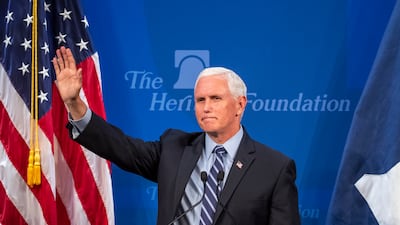Six months ago, a mob of violent rioters ransacked the Capitol chanting, “Hang Mike Pence” — egged on by former president Donald Trump’s Twitter attacks on his vice president over his failure to use his ceremonial role to stop Congress from certifying the 2020 election results, despite his constitutional inability to do so.
That mostly seems to be water under the bridge for Mr Pence as he lays the groundwork for a potential 2024 presidential run.
Despite the fact that Mr Trump himself also may have his eyes on a 2024 campaign, Mr Pence went to great lengths to tie himself closely to the former president’s legacy on China in a foreign policy address on Wednesday.
Not to be outdone, former secretary of state Mike Pompeo — who likewise has his sights set on the 2024 campaign trail — also played the tough-on-China card during his own remarks on Friday.
Mr Pence and Mr Pompeo have both started to make frequent visits to key states in the US presidential primary system and have taken plum positions at conservative think tanks in Washington.
Their early remarks are indicative of the strong grip that Mr Trump still holds on the Republican Party, including his hawkish approach to China, which both prospective candidates have closely tied themselves to when outlining their foreign policy vision.
The former vice president devoted an entire speech to China on Wednesday during an address at the conservative Heritage Foundation, which he joined this year as a distinguished visiting fellow. During the address, Mr Pence praised the Trump administration’s hard-line approach to China as a response to decades of what he framed as Beijing’s military, trade and human rights abuses.
“America’s leaders, both Republican and Democrat, have failed to address these abuses under the mistaken belief that China’s newfound prosperity would inevitably lead to liberty,” said Mr Pence. “That changed when President Donald Trump arrived in the White House.”
The former vice president continues to walk a fine line between linking himself to Mr Trump’s legacy while squaring the rift that developed between the two over the failed January 6 insurrection at the Capitol.
In a visit to New Hampshire last month, Mr Pence referred to January 6 as “a dark day in the history of the US Capitol".
“President Trump and I have spoken many times since we left office and I don’t know if we’ll ever see eye to eye on that day,” said Mr Pence.
Still, Mr Pence has endorsed Mr Trump’s baseless allegations of mass voter fraud that served as ammunition for the mob that attempted the insurrection.
A widely publicised new book titled I Alone Can Fix It: Donald J Trump's Catastrophic Final Year by Washington Post reporters Carol Leonnig and Philip Rucker notes that Mr Pence and his family refused to leave the Capitol during the failed insurrection despite the insistence of his Secret Service agents that he do so. Mr Pence reportedly insisted on staying in the besieged building until Congress could finish certifying President Joe Biden's election victory.
The insurrection aside, neither Mr Pence nor Mr Pompeo have shown much appetite to part from the former president on bread-and-butter policy issues, whether that be China or America’s ever-intensifying culture wars.
Mr Pence accused the Biden administration of “rolling over to communist China” during his address at The Heritage Foundation, citing the president’s re-entry into the Paris climate accord and World Health Organisation as well as the State Department’s closure of an inquiry into the origins of the Covid pandemic that Mr Pompeo had launched.
For his part, the former secretary of state used his speech at the Hudson Institute, where he works as a distinguished fellow, to criticise China.
The Biden administration has left several of Mr Trump’s China policies on the books, including $360 billion in tariffs on Chinese goods.
Mr Biden’s State Department has also imposed sanctions on several leaders in the Hong Kong Liaison Office, which serves as the city’s conduit to the Chinese government. It also issued a business advisory that warned American and foreign companies of the risk of operating in Hong Kong.
In his remarks, Mr Pompeo pointed to America's culture wars as being a lightning rod for criticism abroad, noting China’s criticism of the US police crackdown on Black Lives Matter protesters when Chinese and American officials met in Alaska for a contentious summit in March.
Mr Pompeo also referenced similar comments that Russian President Vladimir Putin made during his summit with Mr Biden last month, and characterised the antiracism demonstrators as “radical groups”.
“There are bad actors around the world that are trying to exploit this,” said Mr Pompeo. “They are fuelling this and it’s just very telling.”
It is unclear whether Mr Pence or Mr Pompeo will actually proceed with their apparent plans should Mr Trump ultimately opt to launch another campaign for a second term in the White House.
But in any case, their prospective campaign framework is clear: talk tough on China and double down on American culture wars.
































